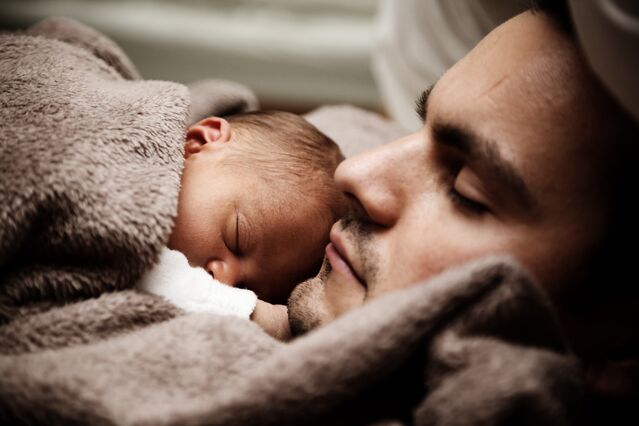Parenting
Why a Full Year of Paid Parental Leave Is Critical to School Success
How attentive parenting during infancy helps children thrive.
Posted June 30, 2021 Reviewed by Chloe Williams
Key points
- Close physical contact and attuned, loving parenting during a baby's first year are critical for mental, physical and social development.
- Lack of attentive parenting can increase impulsivity, behavior problems and pessimism, and it can impact success in school and throughout life.
- To maximize children's potential, parents need paid leave to focus their time and energy on their baby's development during their first year.

President Biden rightfully wants to set us back on the right track with massive investments in education and families — but by the time children arrive at the expanded preschool he has proposed, it may already be too late.
Twentieth-century observational studies of infants by experts including Rene Spitz and John Bowlby suggested that humans’ experiences in infancy profoundly impact our adult social behavior – something that Harry Harlow’s experiments also proved about other primates. Erik Erickson theorized that what happens in our first year determines whether we are more likely to become optimists or pessimists – an immensely important factor in success and happiness throughout life.
In the 21st-century, research — and horrifying natural experiments in humans like the neglected babies raised in Romanian orphanages — have now repeatedly confirmed that the first 10 months are key for human social development.
We evolved to learn from others, never more rapidly than during our first year of life. It is not our genes, but the interaction of our genes with our environments (beginning in utero) that governs how our bodies and brains function. Parenting during infancy can thus either moderate or exacerbate our genetic predispositions, shaping how we react to the outside world through our school years and beyond.
Primates, including humans, are born to have close physical contact with their mothers for prolonged periods of time. Human infants need even more of that contact, as we are born much less developed than other primates — more like a kangaroo joey dependent on its mother’s pouch than an agile baby monkey. Human infants’ body temperature, heart rate, hormone release, brain development and more are profoundly dependent upon physiological synchrony with their primary caretakers.
Lack of attentive, attuned, positive parenting during this sensitive period permanently impacts our mental and physical development. It reduces emotional regulation, mental capacities, empathy, stress management, and formation of positive emotional bonds with others. It also increases impulsivity, behavior problems, loneliness and pessimism. These, in turn, impede school performance and academic success.
A child who arrives at school with poor impulse control, behavioral problems, impaired cognitive capacities, difficulty managing stress and distrust of others is handicapped before preschool begins. Such children are less able to benefit from exposure to new experiences, people and ideas. Their brains are already biased to expect the worst and to focus on negative aspects of every experience. Mentally prepared to reject new situations and new information, they are set up for failure before even meeting the teacher.
Parents Need 12 Months, Not 12 Weeks, of Paid Leave
President Biden’s American Families Plan, which includes universal education for 3-year-olds and expands the child tax credit, is excellent and much needed. However, it overlooks the very most crucial period of development for humans — the first 12 months. Our learning is never faster or more critical to our success throughout life.
The increased child tax credit will lift many families out of poverty, and Biden’s proposed 12 weeks of paid (up to $4,000 per month) parental leave is a good start, but even together they will not provide what infants truly need: a loving, attentive adult available to care for them full time. Parents need time, energy, creativity, and focus to provide the warm, responsive caregiving and bountiful physical contact necessary for their babies’ development in this critical first year.
The most reasonable way to ensure that parents can do this is by providing 10 to 12 months (not weeks) of paid parental leave. Recognizing that — and its importance for maximizing the potential of its future workforce — Sweden provides 480 days of parental leave, paid at 80 percent of full salary, when a child is born or adopted.
America needs to do the same for our parents and children if we are to overcome inequality and the threats to our democracy — and we need that year of paid leave now, not just the 12 weeks phased in over a decade that Biden has proposed.
As John Dewey said, “Democracy has to be born anew every generation, and education is its midwife.” The education that shapes us as citizens begins at birth.
A healthy, functioning democracy depends upon educated, optimistic citizens who have a shared sense of opportunity and mutual responsibility. We will be unable to build a prosperous future and address the mistrust, misinformation, and paranoia currently undermining our society without providing our new citizens with the parenting they need in their critical first year.
While parental leave alone will not cure our deep economic and social inequality, it is a desperately needed piece of the puzzle. To truly invest in our country’s future, we need far more than the paltry 12 weeks Biden is proposing. We need 12 months of paid parental leave and parent education for all. Without that, for too many children, education reform will be too little, too late — no matter how much we spend.
This post first appeared in The New York Daily News.




